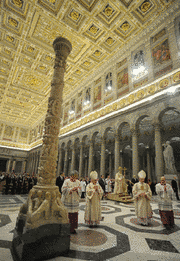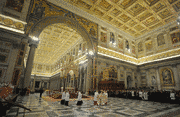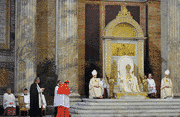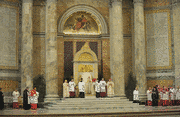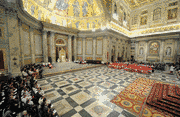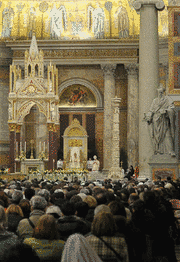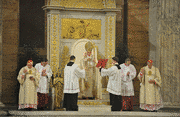Prayer for the Unity of Christians - 2012
We will all be Changed by the Victory of our Lord Jesus Christ
Theme from 1 Cor 15, 51-58
Resources for prayer throughout the year - in Chinese, English, French, German & Spanish.
Jointly prepared and published by The Pontifical Council for Promoting Christian Unity, The Commission on Faith and Order of the World Council of Churches
Preparatory material from Poland – meeting held in Warsaw, Poland
Pope Benedict XVI's Homily at Vespers
at conclusion of the Week of Prayer for Unity
-in English, French, German, Italian, Portuguese & Spanish
"Dear Brothers and Sisters,
With great joy I address my warm greeting to all of you who are gathered in this Basilica on the liturgical Feast of the Conversion of St Paul for the conclusion of the Week of Prayer for Christian Unity this year, in which we shall be celebrating the 50th anniversary of the opening of the Second Vatican Council. It was in this Basilica that Bl. John XXIII announced the Council on 25 January 1959. The theme that has been offered for our meditation in the Week of Prayer which we are concluding today is “We Will All Be Changed by the Victory of Our Lord Jesus Christ” (cf 1 Cor 15:51-58).
The meaning of this mysterious transformation, of which the brief Second Reading speaks to us this evening, is wonderfully demonstrated in St Paul’s personal experience. After the extraordinary event that occurred on the road to Damascus, Saul, who was zealous in his persecution of the nascent Church, was transformed into a tireless apostle of the Gospel of Jesus Christ. It is clear from what happened to this extraordinary evangelizer that his transformation was not the result of long inner reflection nor even the fruit of personal effort. It was first and foremost a work of the grace of God who acted in his own inscrutable ways. This explains why, in writing to the community of Corinth a few years after his conversion, St Paul affirms, as we heard in the first passage of this Vespers: “by the grace of God I am what I am, and his grace toward me was not in vain” (1 Cor 15:10). In addition, in considering attentively what happened to St Paul, one understands that the transformation he experienced in his life is not limited to the ethical level — such as conversion from immorality to morality — nor to the intellectual level — such as a change in his way of understanding reality — but, rather, is a matter of the radical renewal of his being, similar in many aspects to a rebirth. This transformation is founded on participation in the mystery of the death and Resurrection of Jesus Christ and is described as a gradual process of conformation to him. In the light of this awareness, when St Paul was subsequently called to defend the legitimacy of his apostolic vocation and of the Gospel he proclaimed, he was to say: “I have been crucified with Christ; it is no longer I who live, but Christ who lives in me; and the life I now live in the flesh I live by faith in the Son of God, who loved me and gave himself for me” (Gal 2:20).
St Paul’s personal experience enables him to expect with well-founded hope the fulfilment of this mystery of transformation that will concern all who have believed in Jesus Christ, as well as all humanity and the whole of creation. In the short Second Reading proclaimed this evening, St Paul, after developing a long case aimed at strengthening the hope of the Resurrection in the faithful, describes in a few lines, employing the traditional imagery of the apocalyptic literature of his time, the great day of the Last Judgement in which humanity’s destiny will be fulfilled: “In a moment, in the twinkling of an eye, at the last trumpet... the dead will be raised imperishable, and we shall be changed” (1 Cor 15:52). On that day all believers will be brought into conformity with Christ and all that is perishable will be transformed by his glory. St Paul says: “For this perishable nature must put on the imperishable, and this mortal nature must put on immortality” (v 53). Then the triumph of Christ will at last be complete, because, St Paul tells us further, showing how the ancient prophesies of Scripture are brought about, death will be overcome once and for all and with it sin which caused it to enter the world and the Law that establishes sin without providing the power to overcome it: “‘Death is swallowed up in victory’. / ‘O death where is your victory? / O death, where is your sting?’ / The sting of death is sin, and the power of sin is the Law” (v 54-56). St Paul tells us, therefore, that every man and woman, through baptism in the death and Resurrection of Christ, participates in the victory of the One who defeated death first, setting out on a journey of transformation that is manifested from this moment in a newness of life that will reach its fullness at the end of time.
It is very significant that the passage ends with an expression of gratitude: “thanks be to God, who gives us the victory through our Lord Jesus Christ” (v 57). The song of triumph over death changes into a hymn of thanksgiving raised to the Victor. This evening, in celebrating vespers in praise of God, let us too join our voices, minds and hearts in this hymn of thanksgiving for what divine grace worked in the Apostle to the Gentiles and for the wonderful saving plan which God the Father brings about in us through the Lord Jesus Christ. As we raise our prayers we are confident that we too will be transformed and brought into conformity with the image of Christ. This is particularly true in the prayer for Christian unity. Indeed, when we implore the gift of the unity of Christ’s disciples, we make our own the desire expressed by Jesus Christ on the eve of his Passion and death in the prayer he addressed to the Father: “that they may all be one” (Jn 17:21). The prayer for Christian unity for this reason is nothing other than participation in the realization of the divine plan for the Church and the active commitment to reestablishing unity is a task and a great responsibility for everyone.
Although in our day we are experiencing the sorrowful situation of division, we Christians can and must look to the future with hope, since Christ’s victory means surmounting all that prevents us from sharing the fullness of life with him and with others. The Resurrection of Jesus Christ confirms that God’s goodness conquers evil and love conquers death. He accompanies us in the fight against the destructive power of sin that damages humanity and God’s entire creation. The presence of the Risen Christ calls all of us Christians to act together in the cause of good. United in Christ, we are called to share his mission, which is to bring hope to wherever injustice, hatred and desperation prevail. Our divisions dim our witness to Christ. The goal of full unity, which we await in active hope and for which we pray trustingly, is no secondary victory but an important one for the good of the human family.
In the dominant culture today, the idea of victory is often associated with instant success. In the Christian perspective, on the contrary, victory is a long, and in our human eyes, not always uncomplicated process of transformation and growth in goodness. It happens in accordance with God’s time, not ours, and requires of us deep faith and patient perseverance. Although the Kingdom of God bursts definitively into history with Jesus’ Resurrection, it has not yet come about fully. The final victory will only be won with the Second Coming of the Lord, which we await with patient hope. Our expectation of the visible unity of the Church must also be patient and trusting. Only in this frame of mind do our prayers and our daily commitment to Christian unity find their full meaning. The attitude of patient waiting does not mean passivity or resignation but rather a prompt and attentive response to every possibility of communion and brotherhood that the Lord gives us.
In this spiritual climate I would like to extend special greetings, first to Cardinal Monterisi, Archpriest of this Basilica, and to the Abbot and the community of Benedictine monks for hosting us. I greet Cardinal Koch, President of the Pontifical Council for Promoting Christian Unity, and all the co-workers of this Dicastery. I address my cordial and brotherly greetings to His Eminence Metropolitan Gennadios, Representative of the Ecumenical Patriarchate, and to Reverend Canon Richardson, Personal Representative in Rome of the Archbishop of Canterbury, and to all the Representatives of the various Churches and Ecclesial Communities gathered here this evening. In addition, I am particularly glad to greet several members of the Working Group composed of spokespeople of the various Churches and Ecclesial Communities present in Poland, who prepared the booklets for the Week of Prayer this year. I would like to express my gratitude to them and my hope that they will continue on the way of reconciliation and fruitful collaboration. I am also pleased to greet the members of the Global Christian Forum who are in Rome in these days to reflect on increasing the number of participants in the ecumenical movement to include new members. Further, I greet the group of students from the Ecumenical Institute of Bossey of the World Council of Churches.
I would like to entrust to St Paul’s intercession all those who, with their prayers and their commitment, are sparing no effort in the cause of Christian unity. Although, at times, one has the impression that there is still a long way to go to reach the reestablishment of communion and that the road is fraught with obstacles, I invite all to renew their determination to pursue, with courage and generosity, the unity which is God’s will, after the example of St Paul who, in the face of every kind of difficulty always firmly kept his trust in God which led to the fulfilment of his work. Moreover, on this journey there is no lack of positive signs of rediscovered brotherhood and of a shared sense of responsibility for the great problems that are afflicting our world. All this is a cause of joy and of great hope and must encourage us to continue in our endeavour to reach the final goal all together, knowing that in the Lord our effort is not in vain (cf 1 Cor 15:58). Amen."
BXVI - Basilica of Saint Paul Outside the Walls, Rome - Feast of the Conversion of St Paul, 25 January 2012
Papa Benedetto's Address during the Week of Prayer for Unity
-in Croatian, English, French, German, Italian, Portuguese & Spanish
"Dear Brothers and Sisters,
The Week of Prayer for Christian Unity begins today. For more than a century it has been celebrated every year by Christians of all Churches and ecclesial communities in order to invoke the extraordinary gift for which the Lord Jesus himself prayed at the Last Supper, before his Passion: “that they may all be one; even as you, Father, are in me, and I in you, that they also may be in us, so that the world may believe that you have sent me” (Jn 17:21). The practice of the Week of Prayer for Christian Unity was introduced in 1908 by Fr Paul Wattson, the founder of an Anglican religious community who later entered the Catholic Church. The initiative received the blessing of Pope St Pius X and was later promoted by Pope Benedict XV, who encouraged its celebration throughout the Catholic Church with the Brief Romanorum Pontificum of 25 February 1916.
The Octave of Prayer was developed and perfected in the 1930s by Abbé Paul Couturier of Lyons, who supported the prayer “for the unity of the Church as Christ wants her and in conformity with the instruments that he desires”. His last writings show that Abbé Couturier saw this Week as a means which enables Christ’s universal prayer “to enter and penetrate the entire Body of Christians”; it must grow until it becomes “an immense, unanimous cry of the entire People of God”, asking God for this great gift. Moreover the Week of Prayer for Christian Unity is in itself one of the most effective expressions of the impetus the Second Vatican Council gave to the search for full communion among all Christ’s disciples. May this spiritual event that unites Christians of all traditions increase our awareness that the true unity for which we strive cannot be solely the result of our own efforts but, rather, will be a gift from on high, to be ceaselessly prayed for.
Every year the booklets for the Week of Prayer are compiled by an ecumenical group from a different region of the world. I would like to reflect here on this point. This year the texts have been proposed by a joint group of representatives of the Catholic Church and of the Polish Ecumenical Council, comprised of various Churches and ecclesial communities of the country. The documentation was then revised by a committee made up of members of the Pontifical Council for Promoting Christian Unity and of the Faith and Order Commission of the World Council of Churches. This work done in two phases, is a further sign of the desire for unity that motivates Christians and of the awareness that prayer is the main way to attain full communion since if we are united in our orientation to the Lord we are on our way to unity. The theme of this year’s Week — as we have heard — was taken from the First Letter to the Corinthians: “We shall all be changed ... by the victory of our Lord Jesus Christ” (cf. 1 Cor 15:51-58), his victory will transform us. This theme was suggested by the large Polish ecumenical group, as I mentioned, which, reflecting on its experience as a nation, chose to emphasize how strong the support of the Christian faith is in trials and upheavals, such as those that have marked the history of Poland. After much discussion, a theme was chosen which focuses on the transforming power of faith in Christ and in particular in the light of its importance to our prayers for the visible unity of the Church, the Body of Christ. The inspiration for this reflection was drawn from St Paul’s words to the Church in Corinth. He speaks of the transitory nature of what belongs to our life in the present, marked too by the experience of the “defeat” of sin and death, in comparison with what Christ’s “victory” over sin and death in his Paschal Mystery brings to us.
The particular history of the Polish nation which experienced periods of democratic coexistence and religious freedom, as in the 16th century, was marked in the last centuries by invasions and defeats, the constant struggle against oppression and the thirst for freedom. It was all this that led the ecumenical group to reflect more deeply on the true meaning of “victory” — what victory is — and of “defeat”. Concerning “victory” understood in triumphalistic terms, Christ suggests to us a very different road that does not pass through dominance and power. Indeed, he says: “If anyone would be first, he must be last of all and servant of all” (Mk 9:35). Christ speaks of a victory through suffering love, reciprocal service, help, new hope and practical comfort given to the lowliest, to the forgotten, to the outcast. For all Christians the loftiest expression of this humble service is Jesus Christ himself, the total gift that he makes of himself, the victory of his love over death, on the cross, that shines in the light of Easter morning. Only if we let ourselves be transformed by God, only if we undertake to convert our life and if the transformation is brought about in the form of conversion can we share in this transforming “victory”. This is the reason why the Polish ecumenical group considered St Paul’s words: “We shall all be changed by the victory of our Lord Jesus Christ” (cf. 1 Cor 15:51-58) particularly appropriate for the theme of its meditation.
The full and visible Christian unity that we long for demands that we let ourselves be transformed and that we conform ever more perfectly to the image of Christ. The unity we pray for requires an inner conversion that is both common and personal. It is not merely a matter of cordiality or cooperation, it is necessary above all to strengthen our faith in God, in the God of Jesus Christ, who spoke to us and made himself one of us. It is necessary to enter into new life in Christ, who is our true and definitive victory; it is necessary to open ourselves to one another, understanding all the elements of unity that God keeps for us and gives us ever anew; it is necessary to be aware of the urgent need to bear witness among the people of our time to the living God, who made himself known in Christ.
The Second Vatican Council made the ecumenical search the centre of the Church’s life and activity: “The Sacred Council exhorts all the Catholic faithful to recognize the signs of the times and to take an active and intelligent part in the work of ecumenism” (Unitatis Redintegratio, n. 4). Blessed John Paul II underlined the essential nature of this task, saying, “This unity, which the Lord has bestowed on his Church and in which he wishes to embrace all people, is not something added on, but stands at the very heart of Christ's mission. Nor is it some secondary attribute of the community of his disciples. Rather, it belongs to the very essence of this community” (Encyclical Ut Unum Sint, n. 9). Hence the ecumenical task is a responsibility of the entire Church and of all the baptized, who must develop the partial communion that already exists among Christians and make it grow into full communion in truth and in charity. The prayer for unity is consequently not restricted to this Week of Prayer but must become an integral part of our prayers, of the life of prayer of all Christians, in every place and in every time, especially when people of different traditions meet and work together for the victory, in Christ, over all that is sin, evil, injustice and the violation of human dignity.
Since the birth of the modern ecumenical movement, more than a century ago, there has always been a clear awareness that the lack of unity among Christians is an obstacle to a more effective proclamation of the Gospel, because it endangers our credibility. How can we give a convincing witness if we are divided? Of course, the fundamental truths of the faith unite us far more than they divide us. Yet the divisions remain, and also concern various practical and ethical issues, giving rise to confusion and diffidence, undermining our ability to transmit the saving word of Christ. In this sense, we should remember the words of Bl. John Paul II who spoke in his Encyclical Ut Unum Sint of the damage to Christian witness and to the proclamation of the Gospel that is caused by the lack of unity (cf. nn. 98, 99). This presents an important challenge to the New Evangelization, which will be all the more fruitful when all Christians proclaim together the truth of the Gospel of Jesus Christ and give a common response to the spiritual thirst of our time.
The Church’s path, like that of the peoples, is in the hands of the Risen Christ, victorious over death and over the injustice that he suffered in the name of all. He makes us share in his victory. He alone can transform us and change us from weak and hesitant people into strong and courageous in doing good. He alone can save us from the negative consequences of our divisions. Dear brothers and sisters, I invite everyone to join together more intensely in prayer during this Week for Unity, so that the common witness, solidarity and collaboration among Christians may increase, in the expectation of the glorious day on which we shall profess together the faith handed down by the Apostles and celebrate together the sacraments of our transformation in Christ. Thank you."
BXVI - General Audience, Wednesday 18 January 2012, Paul VI Audience Hall - © Copyright 2012 - Libreria Editrice Vaticana

